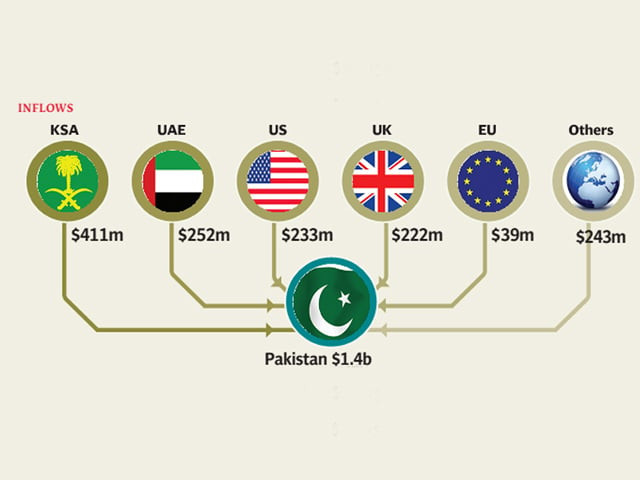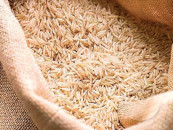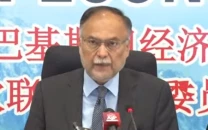In our own backyard: The contribution of remittances
How the govt can use its biggest source of untapped funds.

Inflows during July 2013 from Saudi Arabia, UAE, USA, UK, GCC countries and EU countries amounted to $410.73 million, $252.41 million, $233.06 million, $221.93 million, $161.44 million and $38.59 million respectively.
The economy today is undoubtedly passing through its most challenging period in Pakistan’s history, when numerous internal and external provocations, including energy crises, inflation, food insecurity, lawlessness and accumulated debt crises, are injecting instability and creating a trust deficit. But one thing which remains constant is the contribution of seven million overseas workers in the form of remittances.
During the last several years, overseas Pakistanis contributed $55 billion to Pakistan whereas the International Monetary Fund (IMF) has only given $6 billion in financial assistance to the country. It has been projected officially that the overseas worker may contribute $14 billion by the end of this year against $13 billion in remittances from the preceding year. It is also crucial to know that much of the remittances come through illegal channels which are not widely productive for the economy.
There is colossal potential to improve remittances and direct them to be used on a larger scale for developmental purposes.
In order to meet its working capital obligations, the government should start loan schemes to borrow money from overseas workers, even at a markup rate at which it is borrowing from other lending institutions such as the IMF. By using this option, the government can free itself from the harsh conditions attached with IMF loans, and overseas Pakistanis will be able to invest their savings in their own country at a higher markup rate than what they are getting from abroad.
Studies to calculate the flow of remittances for the economy proved that a larger part of the amount received is consumed by the construction industry, as the overseas worker builds houses, shops and other buildings in the home country. The construction industry is linked to 35 other industries, including cement, iron, glass, wood and paint. When the overseas workers allocate much of their earnings to housing construction, each of these industries grow as a result.
The government can motivate overseas Pakistanis to invest their savings in sectors like manufacturing by giving incentives such as provisions of land. In this way, the government can achieve multidimensional economic goals like job creation, increase in productivity and tax revenue etc.
In order to improve the contribution of overseas Pakistanis to the economy, the government should make it a priority to tackle the obstacles expats face. It has been observed almost 80% of remittances come from the Gulf States, where workers are living in deplorable conditions. In this regard the ministry of overseas Pakistanis can play a major role.
Similarly Pakistani workers in Europe and the United States are also facing a lot of discrimination. Most of the people working in these states are unskilled and exploited as cheap labour. In this regard, the government should tackle their concerns on the diplomatic front. One option that can be feasible is to establish technical institutes abroad.
In the past governments had started many such schemes to enhance the role of overseas in the national economy but all these schemes have failed due to corruption and inefficiency which leads to a trust deficit in overseas workers when it comes to their government. The government should bridge the trust deficit by ensuring transparency and accountability for overseas matters.
The writer hosts business talk shows on FM 101 and Radio Pakistan and is pursuing an M Phil in Economics
Published in The Express Tribune, September 23rd, 2013.
Like Business on Facebook, follow @TribuneBiz on Twitter to stay informed and join in the conversation.



















COMMENTS
Comments are moderated and generally will be posted if they are on-topic and not abusive.
For more information, please see our Comments FAQ